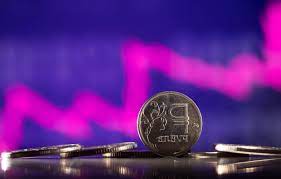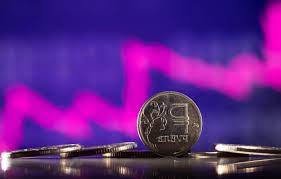
The primary policy rate of Russia's central bank was more than doubled by it on Monday while capital controls have also been imposed as it tries to shield the economy from form the impact of the unprecedented Western sanctions which plunged the rouble to historic lows.
To fight the risks of the rouble's rapid devaluation and greater inflation, which threaten Russians' savings, the primary interest rate will be raised to 20 per cent, the highest in the century, from 9.5 per cent.
"External conditions for the Russian economy have drastically changed," the central bank said, adding that the hike 'will ensure a rise in deposit rates to levels needed to compensate for the increased depreciation and inflation risk".
The central bank also forced enterprises to sell 80 per cent of their foreign currency earnings, expanded the types of assets that may be used as collateral for loans, and temporarily prohibited Russian brokers from selling foreigners' stocks. It did not clarify which securities are subject to the prohibition.
Following Moscow's invasion of Ukraine, the emergency measures put the central bank on the front lines of protecting Russia against a drive by Western allies to economically isolate it.
The central bank has been singled out by the West, which wants to limit its capacity to deploy $640 billion in foreign currency and gold reserves, as well as cut Russia's biggest banks off from the SWIFT financial network, making it difficult for lenders and businesses to send and receive payments.
On Monday, the rouble fell about 30 percent against the dollar to an all-time low. The stock and derivatives markets were also shut down.
Britain said on Monday that it will prohibit Russian corporations from issuing transferrable securities and money market instruments in the UK, as well as any dealings with the Russian central bank, finance ministry, or wealth fund. find out more
The Russian central bank's actions on Monday support previous measures announced on Sunday, such as a promise that the central bank will begin buying gold on the domestic market. It will also hold a no-limit buyback auction and relax limitations on banks' open foreign currency balances.
The government, according to Finance Minister Anton Siluanov, is prepared to bolster commercial banks' capital bases if necessary.
On Sunday, Russians formed lines outside ATMs, fearful that the sanctions would result in cash shortages and payment disruptions.
"A bank run has already started in Russia over the weekend ... and inflation will immediately spike massively, and the Russian banking system is likely to be in trouble," said Jeffrey Halley, Asia-based senior market analyst at OANDA.
In a letter to clients, Nomura analysts predicted that further Western retaliation against Russia would have global ramifications.
"These sanctions from the West are likely to eventually hurt trade flows out of Russia (around 80 per cent of FX transactions handled by Russian financial institutions are denominated in USD), which will also hurt the growth outlook of Russia's key trading partners including Europe and lead to greater inflationary pressures and risk of stagflation, we think," they wrote.
(Source:www.scmp.com)
To fight the risks of the rouble's rapid devaluation and greater inflation, which threaten Russians' savings, the primary interest rate will be raised to 20 per cent, the highest in the century, from 9.5 per cent.
"External conditions for the Russian economy have drastically changed," the central bank said, adding that the hike 'will ensure a rise in deposit rates to levels needed to compensate for the increased depreciation and inflation risk".
The central bank also forced enterprises to sell 80 per cent of their foreign currency earnings, expanded the types of assets that may be used as collateral for loans, and temporarily prohibited Russian brokers from selling foreigners' stocks. It did not clarify which securities are subject to the prohibition.
Following Moscow's invasion of Ukraine, the emergency measures put the central bank on the front lines of protecting Russia against a drive by Western allies to economically isolate it.
The central bank has been singled out by the West, which wants to limit its capacity to deploy $640 billion in foreign currency and gold reserves, as well as cut Russia's biggest banks off from the SWIFT financial network, making it difficult for lenders and businesses to send and receive payments.
On Monday, the rouble fell about 30 percent against the dollar to an all-time low. The stock and derivatives markets were also shut down.
Britain said on Monday that it will prohibit Russian corporations from issuing transferrable securities and money market instruments in the UK, as well as any dealings with the Russian central bank, finance ministry, or wealth fund. find out more
The Russian central bank's actions on Monday support previous measures announced on Sunday, such as a promise that the central bank will begin buying gold on the domestic market. It will also hold a no-limit buyback auction and relax limitations on banks' open foreign currency balances.
The government, according to Finance Minister Anton Siluanov, is prepared to bolster commercial banks' capital bases if necessary.
On Sunday, Russians formed lines outside ATMs, fearful that the sanctions would result in cash shortages and payment disruptions.
"A bank run has already started in Russia over the weekend ... and inflation will immediately spike massively, and the Russian banking system is likely to be in trouble," said Jeffrey Halley, Asia-based senior market analyst at OANDA.
In a letter to clients, Nomura analysts predicted that further Western retaliation against Russia would have global ramifications.
"These sanctions from the West are likely to eventually hurt trade flows out of Russia (around 80 per cent of FX transactions handled by Russian financial institutions are denominated in USD), which will also hurt the growth outlook of Russia's key trading partners including Europe and lead to greater inflationary pressures and risk of stagflation, we think," they wrote.
(Source:www.scmp.com)














